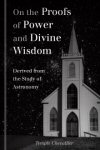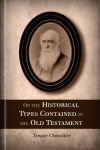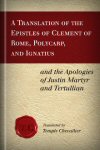Select Works of Temple Chevallier (3 vols.)
Digital Logos Edition
This product has been transferred from Community Pricing to Pre-Pub. The actual funding level may be lower than it appears, which could delay production. The amount of funding still needed will be evaluated and updated soon.
Overview
Temple Chevallier was an Anglican priest and astronomy professor. The Select Works of Temple Chevallier features three volumes of this polymath’s work as astronomer, translator, and Bible scholar. On the Proofs of Divine Power and Wisdom: Derived from the Study of Astronomy features Chevallier’s Hulsean Lectures on God’s wisdom, power, and perfection as revealed in the science of astronomy, as well as answers to astronomers’ objections to Christianity. On the Historical Types Contained in the Old Testament analyzes how Moses, Abraham, David, and other Old Testament figures foreshadowed Christ and were fulfilled by him. And Chevallier’s introduction and translation of various works from Clement, Polycarp, Ignatius, Justin Martyr, and Tertullian offer a useful introduction to these pillars of the early church.
In the Logos edition, Chevallier’s works are enhanced by amazing functionality. Fully integrated into your digital library, you can easily put a scholar’s library of historical texts in conversation with this text. The Timeline feature enables you to instantly contextualize the people, places, and ideas discussed in this volume with thousands of other world events. Perform powerful searches with the topic guide to instantly gather relevant biblical texts and resources. And free tablet and mobile apps let you take the discussion with you. With Logos Bible Software, the most efficient and comprehensive research tools are in one place, so you get the most out of your study.
Key Features
- Presents three volumes from the nineteenth-century polymath, Temple Chevallier
- Includes a classic analysis of God’s power and wisdom in astronomy
- Provides a window into nineteenth-century apologetics and Bible scholarship
Product Details
- Title: Select Works of Temple Chevallier
- Author: Temple Chevallier
- Volumes: 3
- Pages: 1,412

Temple Chevallier was an Anglican priest and astronomy professor. On the Proofs of Divine Power and Wisdom: Derived from the Study of Astronomy features Chevallier’s Hulsean Lectures on God’s wisdom, power, and perfection as revealed in the science of astronomy, as well as answers to astronomers’ objections to Christianity. The lecture series is grounded in Psalm 19. This volume also includes several miscellaneous discourses showcasing Chevallier’s broad knowledge base.

Temple Chevallier was an Anglican priest and astronomy professor. This volume contains a course of Chevallier’s lectures analyzes how Moses, Abraham, David, and other Old Testament figures foreshadowed Christ and were fulfilled by him.

A Translation of the Epistles of Clement of Rome, Polycarp, and Ignatius, and of the Apologies of Justin Martyr and Tertullian
- Authors: Clement, Polycarp, Ignatius, Justin Martyr, Tertullian, Temple Chevallier
- Translator: Temple Chevallier
- Publisher: Francis & John Rivington
- Publication Date: 1851
- Pages: 500
This volume contains Temple Chevallier’s translation and notes on the works of Clement of Rome, Polycarp, Ignatius, Justin Martyr, and Tertullian. It also features a substantial introduction by Chevallier.
About Temple Chevallier
Temple Chevallier (1794–1873) was British clergyman, astronomer, and mathematician. Chevallier attended Pembroke College, Cambridge and was ordained a priest in 1818. He became a fellow at Pembroke College in 1819 and a fellow and tutor at Catharine Hall in 1820. In 1835 he became professor of Astronomy at the University of Durham. He was Chair of Mathematics and Astronomy at Durham from 1841 until 1871. During his time at Durham he was also a reader in Hebrew and gave lectures in divinity. He helped establish the Durham University Observatory, made important observations of Jupiter’s moons, and was the first British astronomer to regularly observe sunspots. He retired in 1871 after a stroke, and he died in 1873.